Exam 8: Supplement: Job Scheduling and Vehicle Routing and Material Flow Analysis and Facility Layouts
Exam 1: Operations Management, Processes, and Supply Chain Management41 Questions
Exam 2: Corporate Strategy, Performance, and Sustainability55 Questions
Exam 3: Product Design and Development50 Questions
Exam 4: Process Design and Capacity Management48 Questions
Exam 5: Customer Relationships and Customer Service50 Questions
Exam 6: Demand Management, Forecasting, and Aggregate Planning45 Questions
Exam 7: Independent Demand Inventory Management45 Questions
Exam 8: Supplement: Job Scheduling and Vehicle Routing and Material Flow Analysis and Facility Layouts93 Questions
Exam 9: Lean Systems50 Questions
Exam 10: Managing Customer and Work Flows50 Questions
Exam 11: Managing Information Flowsmrp and ERP46 Questions
Exam 12: Managing Projects42 Questions
Exam 13: Supplement: Statistical Quality Control and Six Sigma Quality Management97 Questions
Exam 14: Supply Chain Processes50 Questions
Exam 15: Location, Logistics, and Product Returns49 Questions
Exam 16: Integrating Processes Along the Supply Chain42 Questions
Select questions type
Assuming that the customers are ranked in proximity to one another (ie., customer 4 is closer to customer 3 than customer 5 is), use the concurrent scheduler approach to assign deliveries to vehicles such that no deliveries are late and driving distance is minimized. Assume that drive time to each customer is 15 minutes.
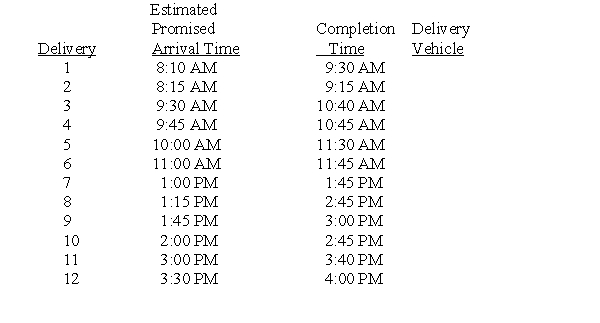 -Determine the start time for Vehicle 2.
-Determine the start time for Vehicle 2.
(Multiple Choice)
4.8/5  (34)
(34)
Assume a facility is open 8 hours a day and requires an output of 600 units a day. The following tasks must be arranged as an assembly line:
 -Considering there are four work centers for the assembly line and assuming 1 worker per work center, calculate the total labor work time.
-Considering there are four work centers for the assembly line and assuming 1 worker per work center, calculate the total labor work time.
(Multiple Choice)
4.9/5  (33)
(33)
William is considering a dispatch rule to satisfy more physicians. William requested that each physician put a desired completion time on each request for blood testing. To investigate the effects of changing the dispatch rules, William decides to take the first five requests for blood work from one of the technicians and analyze job completion under various scheduling rules. The following table shows the time to complete blood work on each sample and the time when the physician has requested that it to be complete.
 -Using the processing order as per the first-come-first-served (FCFS), determine the average tardiness.
-Using the processing order as per the first-come-first-served (FCFS), determine the average tardiness.
(Multiple Choice)
4.9/5  (34)
(34)
Use the Clark and Wright savings heuristic for the following network of customers, starting from location 1. Assume that any diagonal trip must pass through location 5.
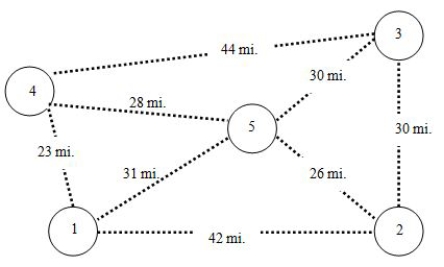 -Based on the savings computed for the paired combinations, which one represents the most acceptable delivery route for the network of customers?
-Based on the savings computed for the paired combinations, which one represents the most acceptable delivery route for the network of customers?
(Multiple Choice)
4.8/5  (32)
(32)
For the Buehler Bakery, the desired output for a 8 hour workday is 450 units. The discrete tasks required to produce the product have been identified, timed in seconds, and ordered as indicated in the table.
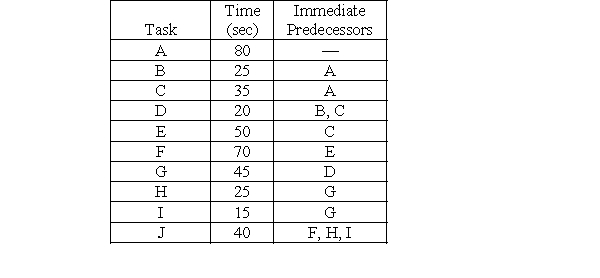 -Process engineers design a line that contains 8 stations. What is the percentage of idle time?
-Process engineers design a line that contains 8 stations. What is the percentage of idle time?
(Multiple Choice)
4.9/5  (34)
(34)
Use the Cluster-first-route-second heuristic for two trucks (10 ton and 8 ton capacities) and the following network of customers with their shipping requirements, starting from location 1.
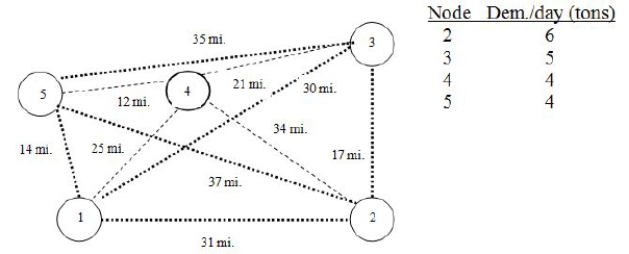 -Using the Clark and Wright savings heuristic, calculate the savings for the paired combinations of delivery nodes 1, 3 and 5.
-Using the Clark and Wright savings heuristic, calculate the savings for the paired combinations of delivery nodes 1, 3 and 5.
(Multiple Choice)
4.8/5  (35)
(35)
The process design team at a contract manufacturer in Thailand has broken an assembly process into 8 basic steps, each with a required time and predecessor, as shown in the table. There are 7.5 productive hours available in a day, and the manufacturer wishes to produce 400 units.
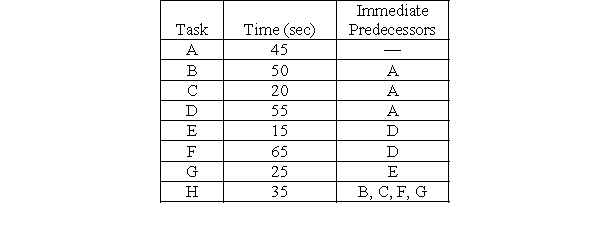 -Operations managers and process engineers design a line that contains 6 stations. What is the efficiency?
-Operations managers and process engineers design a line that contains 6 stations. What is the efficiency?
(Multiple Choice)
4.9/5  (47)
(47)
Assume that all of the jobs below arrived at the same time. Also assume that transfer times are zero and jobs cannot be split
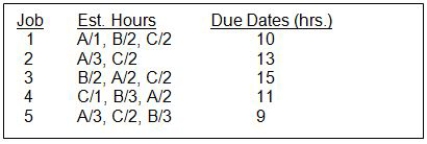 -Calculate the critical ratio for Job 3.
-Calculate the critical ratio for Job 3.
(Multiple Choice)
4.9/5  (37)
(37)
Use the Cluster-first-route-second heuristic for two trucks (10 ton and 8 ton capacities) and the following network of customers with their shipping requirements, starting from location 1.
 -The 10 ton truck can handle the tour with the largest savings. The tour is:
-The 10 ton truck can handle the tour with the largest savings. The tour is:
(Multiple Choice)
4.8/5  (39)
(39)
ADAMS Electricals decided to analyze the job flow of their shop to see if a more effective layout could be designed to reduce average job lead time. They had 6 processing departments in the shop, positioned as shown below. The vertical distance between departments was 30 feet while the horizontal distance was 45 feet. Diagonal moves are not possible.
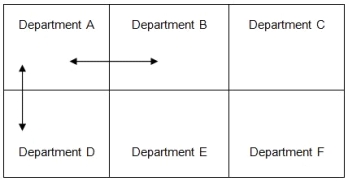 For a typical day, the number of jobs moving from one department to the next was:
For a typical day, the number of jobs moving from one department to the next was:
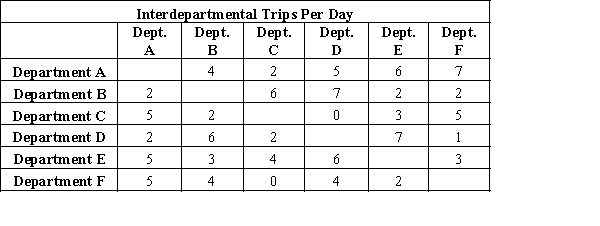 Based on the total distance matrix developed above, ADAMS Electricals decided to make some changes in their layout so that the modified shop layout is now:
Based on the total distance matrix developed above, ADAMS Electricals decided to make some changes in their layout so that the modified shop layout is now:
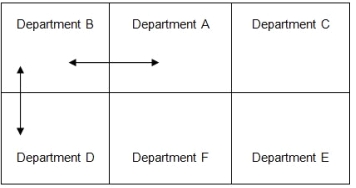 -How much distance is traveled by the 6 jobs from Department D to Department B?
-How much distance is traveled by the 6 jobs from Department D to Department B?
(Multiple Choice)
4.7/5  (27)
(27)
The process design team at a contract manufacturer in Thailand has broken an assembly process into 8 basic steps, each with a required time and predecessor, as shown in the table. There are 7.5 productive hours available in a day, and the manufacturer wishes to produce 400 units.
 -What should their takt time be?
-What should their takt time be?
(Multiple Choice)
4.7/5  (33)
(33)
Assuming that the customers are ranked in proximity to one another (ie., customer 5 is closer to customer 6 than customer 7 is), use the concurrent scheduler approach to assign deliveries to vehicles such that no deliveries are late and driving distance is minimized. Assume that drive time to each customer is 30 minutes.
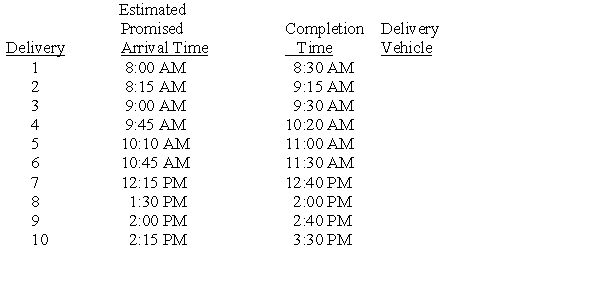 -Determine the delivery schedule of Vehicle 1.
-Determine the delivery schedule of Vehicle 1.
(Multiple Choice)
4.8/5  (35)
(35)
ADAMS Electricals has decided to analyze the job flow of their shop to see if a more effective layout can be designed to reduce average job lead time. They have 6 processing departments in the shop, positioned as shown below. The vertical distance between departments is 30 feet while the horizontal distance is 45 feet. Assume that diagonal moves are not possible.
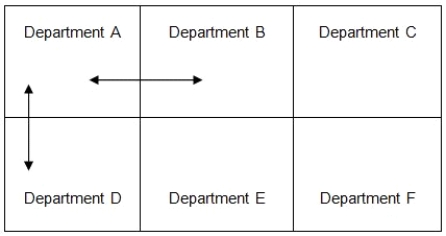 For a typical day, the number of jobs moving from one department to the next is shown in the matrix below.
For a typical day, the number of jobs moving from one department to the next is shown in the matrix below.
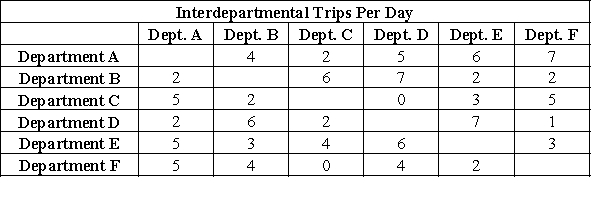 -How much distance is traveled by the 7 jobs from Department A to Department F?
-How much distance is traveled by the 7 jobs from Department A to Department F?
(Multiple Choice)
4.9/5  (36)
(36)
Assume a facility is open 8 hours a day and requires an output of 600 units a day. The following tasks must be arranged as an assembly line:
 -Assuming 1 work center per task, what is the maximum output per day?
-Assuming 1 work center per task, what is the maximum output per day?
(Multiple Choice)
4.9/5  (29)
(29)
The process design team at a medical device manufacturer has broken an assembly process into 8 basic steps, each with a required time and predecessor, as shown in the table. There are 8 productive hours available in a day, and the manufacturer wishes to produce 400 units.
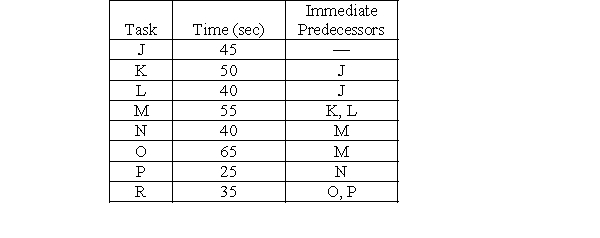 -Operations managers and process engineers design a line that contains 7 stations. What is the percentage of idle time?
-Operations managers and process engineers design a line that contains 7 stations. What is the percentage of idle time?
(Multiple Choice)
4.7/5  (36)
(36)
Assume that all of the jobs below arrived at the same time. Also assume that transfer times are zero and jobs cannot be split
 -Using a Gantt chart and the processing order as per the critical ratio (CR) rule, determine the makespan.
-Using a Gantt chart and the processing order as per the critical ratio (CR) rule, determine the makespan.
(Multiple Choice)
4.8/5  (32)
(32)
Assuming that the customers are ranked in proximity to one another (ie., customer 5 is closer to customer 6 than customer 7 is), use the concurrent scheduler approach to assign deliveries to vehicles such that no deliveries are late and driving distance is minimized. Assume that drive time to each customer is 30 minutes.
 -Determine the start time for Vehicle 1.
-Determine the start time for Vehicle 1.
(Multiple Choice)
4.9/5  (21)
(21)
Assuming that the customers are ranked in proximity to one another (ie., customer 5 is closer to customer 6 than customer 7 is), use the concurrent scheduler approach to assign deliveries to vehicles such that no deliveries are late and driving distance is minimized. Assume that drive time to each customer is 30 minutes.
 -Determine the start time for Vehicle 2.
-Determine the start time for Vehicle 2.
(Multiple Choice)
4.9/5  (30)
(30)
Assuming that the customers are ranked in proximity to one another (ie., customer 4 is closer to customer 3 than customer 5 is), use the concurrent scheduler approach to assign deliveries to vehicles such that no deliveries are late and driving distance is minimized. Assume that drive time to each customer is 15 minutes.
 -Determine the delivery schedule of Vehicle 1.
-Determine the delivery schedule of Vehicle 1.
(Multiple Choice)
4.8/5  (35)
(35)
A tier-two supplier needs to produce 300 coffee pots per 8 hour day. The discrete tasks required to produce a coffee pot have been identified, timed in seconds, and ordered as indicated in the table.
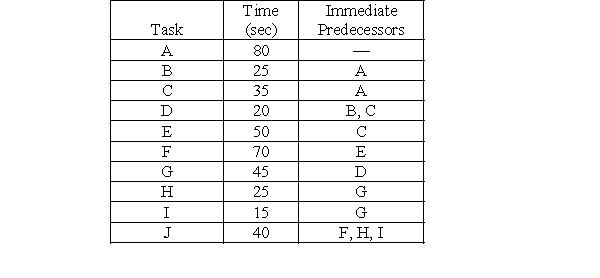 -What should their takt time be?
-What should their takt time be?
(Multiple Choice)
4.9/5  (38)
(38)
Showing 21 - 40 of 93
Filters
- Essay(0)
- Multiple Choice(0)
- Short Answer(0)
- True False(0)
- Matching(0)